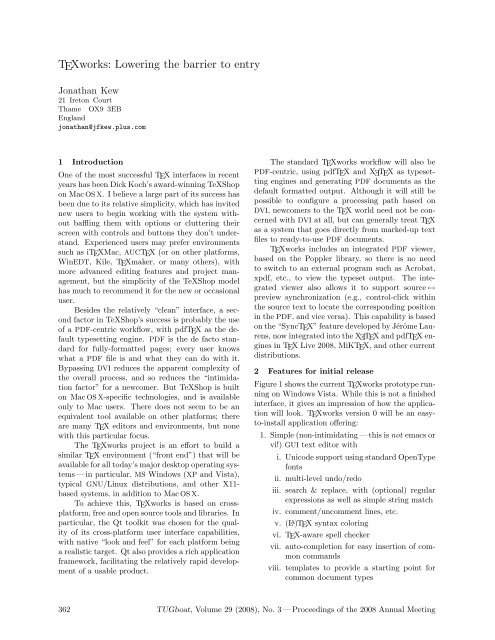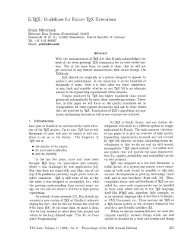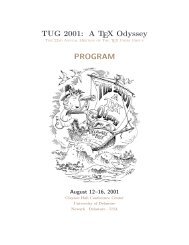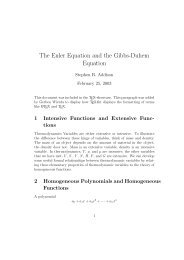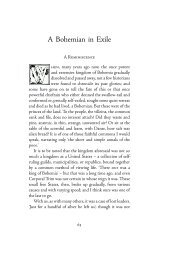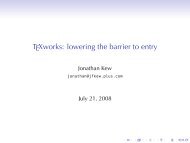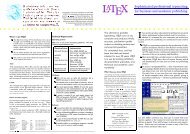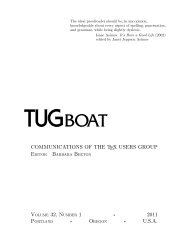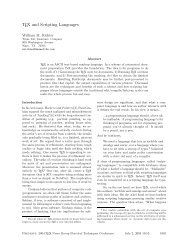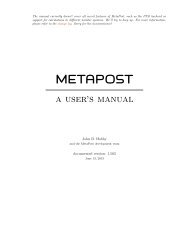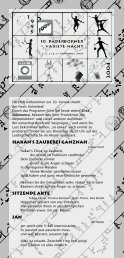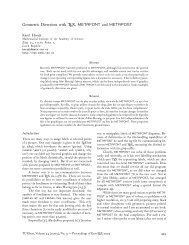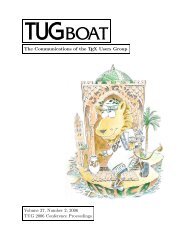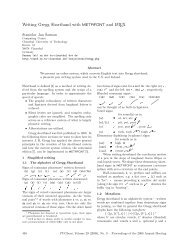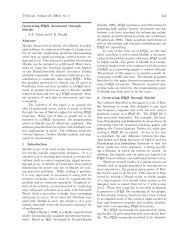The Communications of the TEX Users Group Volume 29 ... - TUG
The Communications of the TEX Users Group Volume 29 ... - TUG
The Communications of the TEX Users Group Volume 29 ... - TUG
You also want an ePaper? Increase the reach of your titles
YUMPU automatically turns print PDFs into web optimized ePapers that Google loves.
<strong>TEX</strong>works: Lowering <strong>the</strong> barrier to entry<br />
Jonathan Kew<br />
21 Ireton Court<br />
Thame OX9 3EB<br />
England<br />
jonathan@jfkew.plus.com<br />
1 Introduction<br />
One <strong>of</strong> <strong>the</strong> most successful <strong>TEX</strong> interfaces in recent<br />
years has been Dick Koch’s award-winning TeXShop<br />
on Mac OSX. I believe a large part <strong>of</strong> its success has<br />
been due to its relative simplicity, which has invited<br />
new users to begin working with <strong>the</strong> system without<br />
baffling <strong>the</strong>m with options or cluttering <strong>the</strong>ir<br />
screen with controls and buttons <strong>the</strong>y don’t understand.<br />
Experienced users may prefer environments<br />
such as i<strong>TEX</strong>Mac, AUC<strong>TEX</strong> (or on o<strong>the</strong>r platforms,<br />
WinEDT, Kile, <strong>TEX</strong>maker, or many o<strong>the</strong>rs), with<br />
more advanced editing features and project management,<br />
but <strong>the</strong> simplicity <strong>of</strong> <strong>the</strong> TeXShop model<br />
has much to recommend it for <strong>the</strong> new or occasional<br />
user.<br />
Besides <strong>the</strong> relatively “clean” interface, a second<br />
factor in TeXShop’s success is probably <strong>the</strong> use<br />
<strong>of</strong> a PDF-centric workflow, with pdf<strong>TEX</strong> as <strong>the</strong> default<br />
typesetting engine. PDF is <strong>the</strong> de facto standard<br />
for fully-formatted pages; every user knows<br />
what a PDF file is and what <strong>the</strong>y can do with it.<br />
Bypassing DVI reduces <strong>the</strong> apparent complexity <strong>of</strong><br />
<strong>the</strong> overall process, and so reduces <strong>the</strong> “intimidation<br />
factor” for a newcomer. But TeXShop is built<br />
on Mac OSX-specific technologies, and is available<br />
only to Mac users. <strong>The</strong>re does not seem to be an<br />
equivalent tool available on o<strong>the</strong>r platforms; <strong>the</strong>re<br />
are many <strong>TEX</strong> editors and environments, but none<br />
with this particular focus.<br />
<strong>The</strong> <strong>TEX</strong>works project is an effort to build a<br />
similar <strong>TEX</strong> environment (“front end”) that will be<br />
available for all today’s major desktop operating systems<br />
—in particular, MS Windows (XP and Vista),<br />
typical GNU/Linux distributions, and o<strong>the</strong>r X11based<br />
systems, in addition to Mac OSX.<br />
To achieve this, <strong>TEX</strong>works is based on crossplatform,<br />
free and open source tools and libraries. In<br />
particular, <strong>the</strong> Qt toolkit was chosen for <strong>the</strong> quality<br />
<strong>of</strong> its cross-platform user interface capabilities,<br />
with native “look and feel” for each platform being<br />
a realistic target. Qt also provides a rich application<br />
framework, facilitating <strong>the</strong> relatively rapid development<br />
<strong>of</strong> a usable product.<br />
<strong>The</strong> standard <strong>TEX</strong>works workflow will also be<br />
PDF-centric, using pdf<strong>TEX</strong> and XE <strong>TEX</strong> as typesetting<br />
engines and generating PDF documents as <strong>the</strong><br />
default formatted output. Although it will still be<br />
possible to configure a processing path based on<br />
DVI, newcomers to <strong>the</strong> <strong>TEX</strong> world need not be concerned<br />
with DVI at all, but can generally treat <strong>TEX</strong><br />
as a system that goes directly from marked-up text<br />
files to ready-to-use PDF documents.<br />
<strong>TEX</strong>works includes an integrated PDF viewer,<br />
based on <strong>the</strong> Poppler library, so <strong>the</strong>re is no need<br />
to switch to an external program such as Acrobat,<br />
xpdf, etc., to view <strong>the</strong> typeset output. <strong>The</strong> integrated<br />
viewer also allows it to support source ↔<br />
preview synchronization (e.g., control-click within<br />
<strong>the</strong> source text to locate <strong>the</strong> corresponding position<br />
in <strong>the</strong> PDF, and vice versa). This capability is based<br />
on <strong>the</strong> “Sync<strong>TEX</strong>” feature developed by Jérôme Laurens,<br />
now integrated into <strong>the</strong> XE <strong>TEX</strong> and pdf<strong>TEX</strong> engines<br />
in <strong>TEX</strong> Live 2008, MiK<strong>TEX</strong>, and o<strong>the</strong>r current<br />
distributions.<br />
2 Features for initial release<br />
Figure 1 shows <strong>the</strong> current <strong>TEX</strong>works prototype running<br />
on Windows Vista. While this is not a finished<br />
interface, it gives an impression <strong>of</strong> how <strong>the</strong> application<br />
will look. <strong>TEX</strong>works version 0 will be an easyto-install<br />
application <strong>of</strong>fering:<br />
1. Simple (non-intimidating —this is not emacs or<br />
vi!) GUI text editor with<br />
i. Unicode support using standard OpenType<br />
fonts<br />
ii. multi-level undo/redo<br />
iii. search & replace, with (optional) regular<br />
expressions as well as simple string match<br />
iv. comment/uncomment lines, etc.<br />
v. (L A)<strong>TEX</strong> syntax coloring<br />
vi. <strong>TEX</strong>-aware spell checker<br />
vii. auto-completion for easy insertion <strong>of</strong> common<br />
commands<br />
viii. templates to provide a starting point for<br />
common document types<br />
362 <strong>TUG</strong>boat, <strong>Volume</strong> <strong>29</strong> (2008), No. 3 — Proceedings <strong>of</strong> <strong>the</strong> 2008 Annual Meeting


